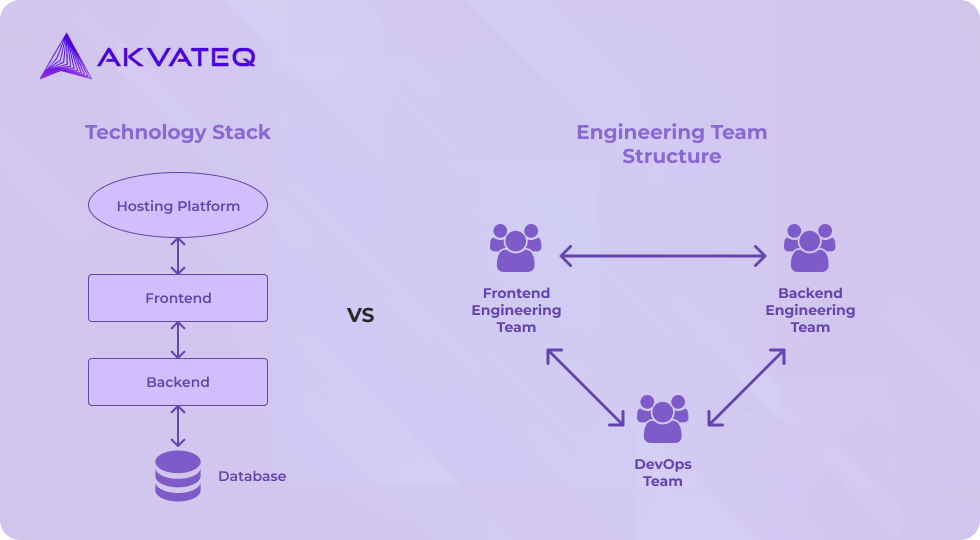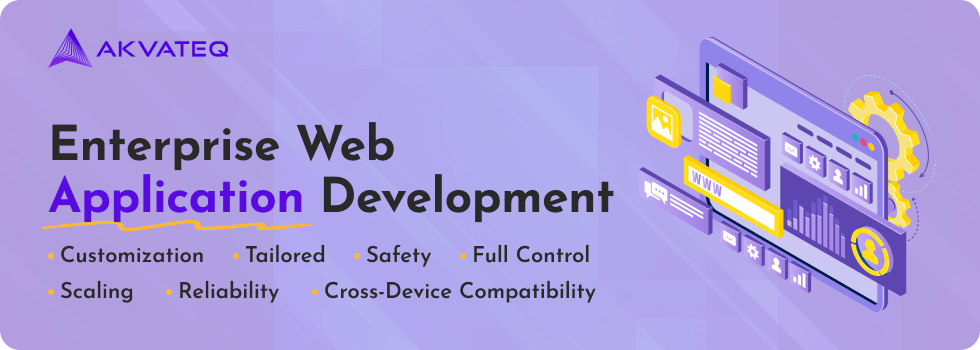In today’s rapidly changing business world, making high-tech, custom software is incredibly important. This is where enterprise-level web applications come into play. Enterprise web development are like super-special websites that are designed specifically for Large organizations. In this article, we’ll take a closer look at the complicated process of creating Enterprise Web Application Development. We’ll also explore why they’re so vital in transforming many industries today. Figure out what big companies actually require. We will uncover some of the tricky problems that developers encounter when building these apps.
Before we dive into learning about making enterprise web applications. It is important to know what makes typical high-quality enterprise websites. This information will help us better measure and understand how complicated they can be from a technical standpoint.
Okay, so enterprise web applications are basically computer software programs made specifically for big companies. You can use them on the Internet, and they’re kept on a cloud computer called a server. This means people from the company can use them online or on their company network. However, not all web apps are for enterprises. So, let’s look at some things that make a web app an “enterprise” one.
Strategic Approach to Web Enterprise Development
An effective enterprise web development endeavor, complementing a robust life cycle model, hinges upon a meticulously designed development process tailored to the corporation’s dimensions, requirements, and resource allocation. This comprehensive development process should encompass the following key facets:
- Design Documentation
- Research
- Specifications
- Integration Analysis
- Design Layout
- Quality Assurance
- Maintenance and Support
By delineating each stage, this well-structured development process ensures a systematic and strategic approach to enterprise web development, fostering efficiency and coherence throughout the entire project lifecycle.
get in touch to discuss your project
Key Characteristics of Enterprise Web Application Development:
Scale with Success:
Enterprise web applications are built to handle a large number of users and a high volume of data. They are designed to scale with the growth of the organization.
Powerful Features, Tailored for Businesses:
They often encompass a wide range of features and functionalities, addressing various aspects of business operations. Some common examples are Customer Relationship Management (CRM), Enterprise Resource Planning (ERP), Human Resources Management (HRM), project management tools, etc.
Connect and Integrate:
Enterprise web apps are created to smoothly work with the systems and databases a company already has. Sometimes, they also have to communicate with other software, like old systems, services from other companies, or other apps the company uses.
Safety First:
Security is a big deal for enterprise’s website. They have to follow special rules to make sure they keep important information safe and don’t lose the trust of their customers and important people connected to the business.
User Authentication and Access Control:
Enterprise apps usually have strong ways to make sure the right people can get into them. They use special systems to check who you are and what you’re allowed to do in the app. So, not everyone can access everything, just have appropriate levels of access to different parts of the application.
Customization and Flexibility:
You can make these apps fit your needs perfectly. They’re very flexible and can change to match how your organization works. This means businesses can make the app work with many customization options.
Reporting and Analytics:
Enterprise applications often include reporting and analytics features, allowing users to generate custom reports and gain insights from the data within the application. This supports data-driven decision-making.
Reliability and Up-time:
Enterprise apps need to work really well without many breaks or downtime. Companies use them for important things, so if they stop working, it can cause big problems.
Cross-Device Compatibility:
These apps are made to work on lots of different devices like computers, laptops, tablets, and phones. That way, they can be used by all sorts of people who like different devices.
Long-Term Support and Maintenance:
Since enterprise applications play a central role in business operations. They require ongoing maintenance, updates, and support to ensure they remain effective and secure over time.
get in touch to discuss your project
Enterprise Web Development:
Now that we understand what makes an enterprise app special, let’s talk about why building these apps is a big deal for software developers. These apps are like the technological backbone of large organizations. They have to handle complicated tasks, manage a lot of data, and make sure the company runs smoothly. So, making them isn’t easy. Let’s look at some of the tough problems that developers might run into along the way.
- Complex Requirements:
- Enterprise apps often have to handle a bunch of complicated business tasks and features. Figuring out, describing, and building all these complex things can be tough.
- Scalability:
- It’s super important that the app can handle more and more users and data without slowing down. Making the app grow to meet future needs can be a complex task.
- Security and Compliance:
- Keeping important data safe and following industry rules is important. Engineering teams need to put strong security measures in place to make sure to safeguard against breaches and unauthorized access.
- Integration with Existing Systems:
- Lots of big companies use a mix of legacy systems, databases, and services from third parties. Making the new app work with all these old systems can be tough because they use different technologies, data types, and communication protocols.
- User Authentication and Authorization:
- Establishing a secure and flexible user authentication system, as well as defining granular access controls based on roles and permissions within the organization, requires careful planning and implementation.
- Performance Optimization:
- Optimizing the application for speed and responsiveness. Especially when dealing with large datasets or resource-intensive operations. That is crucial for delivering a seamless user experience.
- User Experience (UX) Design:
- Balancing functionality with an intuitive and user-friendly interface is vital. Creating a positive user experience requires careful consideration of design, layout, and navigation. Experienced and talented UX developer is the key to enterprise web development.
- Cross-Device Compatibility:
- Ensuring that the application functions smoothly across various devices, including desktops, laptops, tablets, and smartphones, can be a complex task due to differences in screen sizes, resolutions, and input methods.
- Data Management and Storage:
- Creating a smart way to organize and get data. Making sure it’s stored and handled well, and keeping the data reliable and accurate are all super important when building the app.
- Fault Tolerance and Reliability:
- Building systems that can gracefully handle errors. Recovering from failures, and maintaining high availability is crucial for ensuring uninterrupted operation.
The problems we’ve talked about are just a small part of all the hard things that tech teams deal with when making big business apps. Each challenge needs a lot of thinking, tech skills, and smart planning to solve. But when the development teams handle these issues well, they can create strong and useful enterprise apps that help companies succeed in today’s tough business world.
Technology-stack of Enterprise-grade apps:

Enterprise web application development usually means using a bunch of different technologies all working together like a team. So, we need special groups of people who are experts in each part of the app to make sure everything fits together smoothly and works well. These expert teams handle different parts of the app, and each part has its own job. Now, let’s look at what each team does and what skills they need.
Frontend Development Team:
In the world of enterprise web application development, the frontend team takes center stage in crafting the user interface. The face of the application that users interact with. They’re similar to architects and interior designers. Their job is to create an app that’s easy to use, looks great, and works really smoothly. This team is crucial because they bridge the gap between a complex backend system and the end-users who rely on the application. They ensure that the application is not only functional but also user-friendly, catering to a diverse audience.
get in touch to discuss your project
Responsibilities:
Some key responsibilities that fall under the umbrella of a frontend engineer are:
- Designing User Interfaces (UI):
- Creating visually appealing layouts and user interfaces that are intuitive and easy to navigate.
- Interactive Element Implementation:
- Incorporating elements like buttons, forms, and interactive features to enhance user engagement.
- Ensuring Responsiveness:
- Optimizing the design for various screen sizes and devices to provide a consistent user experience.
- Accessibility and Usability:
- Ensuring that the UI is accessible to all users, including those with disabilities, and that it meets usability best practices.
Required Technical Skill-sets:
- Core Front-end Technologies:
- Proficiency in HTML, CSS, and JavaScript are some of the core technologies for building web pages and adding interactivity.
- Modern Web Frameworks:
- Experience with popular frameworks and libraries along with core technologies such as React, Angular, and Vue.js can expedite and improve the development of dynamic and interactive user interfaces.
- Third-party libraries
- Using open-source libraries is often an underrated skill when it comes to implementing out-of-the-box functionalities. But let’s suppose your team was planning to develop a complex dashboard. In this scenario, having an individual who is familiar with a charting library like d3.js can significantly speed up the development process.
- UI/UX Design Principles:
- Understanding of design principles, user flow, and user experience best practices.
- Responsive Design:
- Knowledge of techniques to create layouts that adapt to different screen sizes.
- Cross-Browser Compatibility:
- Ability to write code that functions consistently across different web browsers.
Backend Development Team:
Working in the background, the back-end development team is like the engine that makes the enterprise web app go. They deal with all the important stuff like how the app works, processes data, and handles the main business tasks. A back-end engineer’s job is to make sure the app runs well, handles data right, and does everything securely. They play a big role in making the app strong, dependable, and able to grow. Backend developers for enterprise web development primarily code in Node, Python, PHP, or other languages.
This team architects the application’s core functionality. They interact with databases, managing data storage, retrieval, and manipulation. Furthermore, their expertise extends to designing APIs that enable seamless communication between different parts of the application. The backend team’s significance lies in their ability to create a sturdy foundation, ensuring the application’s reliability and performance even under heavy workloads.
get in touch to discuss your project
Responsibilities:
Some key responsibilities that fall under the umbrella of a frontend engineer are:
- Server-Side Logic:
- Writing code that handles requests from the front end, processes data, and communicates with databases.
- Data Management:
- Implementing database operations like querying, updating, and managing data.
- Security Measures:
- Integrating security measures like encryption, authentication, and authorization to protect against vulnerabilities.
- Scalability and Performance Optimization:
- Designing the backend to handle a large number of users and optimizing code for efficiency.
Required Technical Skill-sets:
- Backend Programming Language:
- Proficiency in a server-side language like Java, C#, Python, or Node.js is mandatory for server-side development.
- Database Management:
- Knowledge of working with relational databases (SQL) or NoSQL databases.
- Backend Framework:
- Experience with frameworks like Spring, Nest.js, and ASP. NET or Django, is essential, which will streamline backend development.
- API Design and Development:
- Ability to design and implement APIs for communication between different parts of the application.
Hosting and Infrastructure Team :
In some companies, there’s a special DevOps team that takes care of things like hosting the web apps and setting up the technical stuff. But when it comes to making enterprise web applications, the Hosting and Infrastructure Team is like the master builders. They create the digital base where the app lives and works. Their job includes setting up and keeping the servers in good shape, so the app runs safely, and steadily, and can handle lots of users. They’re the behind-the-scenes heroes who make sure the app’s technical foundation stays strong and dependable, even when it’s working really hard.
To make sure the app is top-notch, this team needs to be really good at using cloud platforms like AWS, Azure, or Google Cloud. They’re like the people who set up the app on virtual servers in the cloud. They use special tools like Docker and Kubernetes to make sure the app is always put in the same, efficient way. They also add important security measures like locking up the data and setting up digital shields to protect against hackers. Their job is all about making sure the app runs smoothly, and safely. They make sure the application performs, even amidst the ever-evolving digital landscape.
get in touch to discuss your project
Responsibilities:
Some key responsibilities which fall under the umbrella of individuals in this team are:
- Server Setup and Configuration:
- Setting up the server environment, configuring operating systems, and installing necessary software.
- Security and Compliance:
- Implementing security measures, firewalls, and compliance protocols to protect against threats.
- Scalability and Load Balancing:
- Ensuring the infrastructure can handle increasing workloads by distributing traffic effectively.
- Monitoring and Maintenance:
- Keeping an eye on server health, and performance, and addressing any issues promptly.
Required Technical Skill-sets:
- Cloud Platforms :
- Proficiency in deploying and managing applications on major cloud platforms such as AWS, Azure, and Google Cloud Platform (GCP).
- Containerization and Orchestration:
- Experience with technologies that streamline deployment and scaling of applications, tools such as Docker and Kubernetes are often required for containerizing applications and deploying them in isolation.
- Security Protocols and Best Practices:
- Knowledge of encryption, firewall setup, and compliance standards is also mandatory for such teams.
- Networking and Server Administration:
- Understanding of network configurations, protocols, and server management.
In simple terms, these teams need to work together and use their special skills to make enterprise-grade web applications. They communicate with each other and make sure all the parts of the app fit together perfectly. So it becomes a strong and high-quality app. They also need to keep working together even after the app is done to fix any problems. This collaboration is needed for efficient troubleshooting, maintenance, and updates throughout the application’s life cycle.
Conclusion:
In today’s tech-driven world, enterprise-grade web applications play a crucial role in helping big businesses work smarter and grow faster. Building them comes with its own set of challenges, but by forming a robust team with diverse skill sets, organizations can stay at the forefront of their industries. It’s established that as technology continues to evolve, these special web apps will keep shaping the way businesses operate in the future.



















